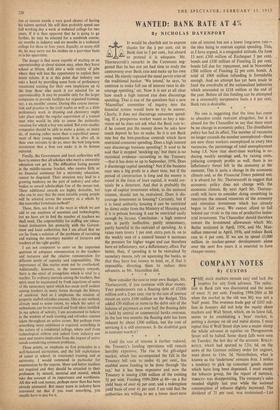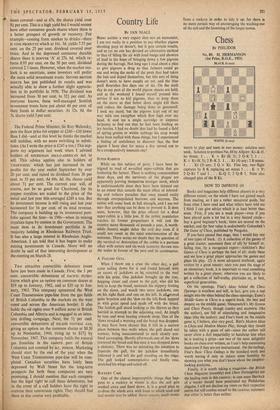COMPANY NOTES
By CUSTOS ry, HE stock markets remain easy and lack the I impetus for any fresh advance. The reduc- tion in Bank rate was discounted and the issue of • more 34- per cent. Funding 1999-2004 at 80 when the market in the old was 804 was not a `bull' point. The overseas trade gap of £103 mil- lion in January did not help the equity share markets and Wall Street, which', on its latest fall, seems to be establishing a 'bear' market, is putting a damper on oil and metal shares. I must repeat that if Wall Street slips into a major slump the whole advance in equities on Throgmorton Street will be halted. Some sharp falls were seen on Tuesday, the last day of the account. Rotas- ROYCE, which had spurted to 121s. 6d. on thp news of the German military order for engines, were down to 116s. 3d. Nevertheless, what is known as the `undertone' remains firm. I notice a tendency to pick up consumer goods shares which have long been depressed. I must except the tobacco group, for the report of IMPERIAL TOBACCO was disappointing. The company's sales receded slightly last year while the national consumption of tobacco slightly increased. The dividend of 21 per cent. was maintained-1.64
times covered—and at 47s. the shares yield over 8+ per cent. This is a high yield but I would sooner have other consumer goods shares where there is a better prospect of growth or recovery. For example—coming from smokes to drinks—there is VINE PRODUCES which at 16s. 3d. yields 7.55 per cent. on the 25 per cent. dividend covered over twice. And in the depressed consumer durable shares there is HOOVER 'A' at 27s. 6d. which re- turns 8.95 per cent. on the 50 per cent. dividend covered 2.3 times. However, when the market out- look is so uncertain, some investors will prefer the more solid investment trusts. SECOND BRITISH ASSETS has just published its results and was actually able to show a further slight apprecia- tion in its portfolio in 1956. The dividend was increased from 30 per cent. to 321- per cent. As everyone knows, these well-managed Scottish investment trusts have put about 40 per cent. of their funds in dollar securities. At 32s. 9d. the 5s. shares yield 5 per cent.
The Federal Prime Minister, Sir Roy Welensky, puts the floor price for copper at £240—£10 lower than I did—and at this level he thinks the market will stabilise, with no more switching to substi- tutes. (As I write the price is £245 a ton.) This sup- ports my argument last week when I advised holders of RHODESIAN ANGLO-AMERICAN not to sell. This advice applies also to holders of 'CHARTERED,' which has just increased its net profits for the year ended September by over 20 per cent. and raised its dividend from 30 per cent, to 35 per cent. At 69s. 6d. the shares yield about 7+ per cent. The current year will, of course, not be so good for Chartered, for its copper royalties are scaled to the price of the metal and last year this averaged £289 a ton. But its investment income is still rising and last year accounted for 16 per cent, of its total revenue. The company is building up its investment port- folio against the time—in 1986—when its mining royalties lapse by cession to the Government. The main item in its investment portfolio is its majority holding in Rhodesian Railways Trust. It has also a large interest in Rhodesian Anglo- American. I am told that it has begun to make mining investments in Canada. More will no doubt be said of that interesting development at the meeting on March 28.
•
Two attractive convertible debenture issues have just been made in Canada. First, the 5 per cent, convertible debentures of PACIFIC PETRO- LEUM which give an option on common shares at $19 up to January, 1962, and at $20 up to Jan- uary, 1963. This company sponsored the West Coast Transmission pipe-line from the gas fields of British Columbia to the markets on the west coast and across the American border. It also holds the oil rights over. 9 million acres in British Columbia and Alberta and is engaged in an inten- sive drilling campaign. Next, the 5f per cent. convertible debentures of INLAND NATURAL GAS, giving an option on the common shares at $8.50 up to November, 1960, rising up to $171 by November, 1967. This company holds the natural gas franchise in the eastern part of British Columbia not covered by B.C. POWER. Marketing should start by the end of the year when the West Coast Transmission pipe-line will be com- pleted. Canadian securities have lately been depressed by Wall Street but the long-term prospects for both these companies are very promising. I should mention that each company has the legal right to call these debentures, but in the event of a call holders have the right to exercise their conversion rights. They should find them in due course very profitable.



































 Previous page
Previous page